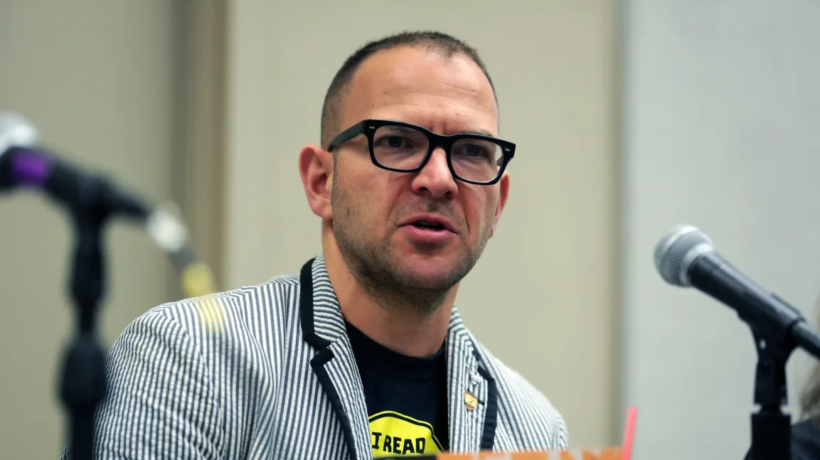When science fiction writer and activist Cory Doctorow releases his new novel, Attack Surface, next month, you’ll be able to pick up a physical copy from Amazon. If you’d prefer an e-book, you’ll be able to download it on Amazon’s Kindle, Barnes & Noble’s Nook, and other mainstream digital book platforms.
That, Doctorow explains, is because audiobooks sold through Audible must be bundled with copyright protection, or digital rights management (DRM) controls, whether authors or publishers want to include such restrictions or not. The DRM technology not only makes it harder to pirate audiobooks, but also restricts playback to devices and software authorised by Audible, which Amazon bought in 2008. For traditional e-books, Amazon lets publishers offering titles on Kindle decide whether or not to include DRM.
“We should not live in a world where manufacturers get to decide how you use their products once you buy them,” Doctorow says.
I have a favor to ask of you. I don’t often ask readers for stuff, but this is maybe the most important ask of my career. It’s a Kickstarter – I know, ‘another crowdfunder?’ – but it’s:
a) Really cool;
b) Potentially transformative for publishing.
c) Anti-monopolistic
— Cory Doctorow #BLM (@doctorow) September 8, 2020
Amazon didn’t respond to an inquiry from Fast Company.
Companies selling products that are difficult to use with competing technology is nothing new: think of razor manufacturers selling blades that work only with their shaving equipment, or decades of video game systems that only play games made specifically for them. But modern vendors of digital goods are protected by a provision in the 1998 Digital Millennium Copyright Act that makes it illegal to circumvent DRM or offer tools for doing so.
“DRM is not just a technology,” Doctorow says. “It’s a law.”
Advocacy groups like the Electronic Frontier Foundation, where Doctorow serves as a consultant, have argued for years that DRM’s legal protection interferes with people’s ability to repair and build parts for hardware like printers and cars, limits research and art that relies on access to copyrighted work, and serves as a nuisance for consumers trying to access legitimately bought content while doing little to stop serious pirates. Proponents of the existing law say it’s necessary to prevent widespread piracy from significantly cutting into the revenue of writers, artists, filmmakers, and the industries around them.
When he announced the Kickstarter campaign on Twitter, Doctorow wrote: “As you probably know, I hate DRM with the heat of 10000 suns: it is a security/privacy nightmare, a monopolist’s best friend, and a gross insult to human rights. As you may also know, Audible will not carry any audiobooks unless they have DRM.”
This is not the first time Doctorow, who keeps the rights to his own audiobook production under his agreement with publisher Macmillan, has offered recordings of his books exclusively through non-Amazon platforms. But, he says, it’s the first time he’s launched a major campaign to promote the book through his own channels.
Since its Tuesday launch, the campaign has pulled in more than $104,000 in pledges on Kickstarter from more than 2,600 backers, with the audiobook available to those pledging at least $15. Doctorow, who’s hoping to see at least 10,000 backers, says he attributes some of the campaign’s success to people’s wariness of Amazon, particularly as the company does well during the coronavirus pandemic while smaller businesses struggle.
Undoubtedly some of its success comes from Doctorow’s fame as a bestselling author, an activist well-known in internet politics circles, and a decades-long blogger. The trade-off likely wouldn’t be worth it for all authors, especially those earlier in their careers who don’t have the same following as Doctorow.
Macmillan and other publishers weren’t interested in the audio sales without having Audible as an outlet, Doctorow says.
“I don’t blame them for that,” he says, expressing hope that good sales could make publishers take a different tack in the future. “They’re not charities. They need to make money.”
That means Doctorow is self-producing the audiobook, having coordinated via Zoom with director Cassandra de Cuir of audiobook studio Skyboat Media and with author and actress Amber Benson—perhaps best known for her role on Buffy the Vampire Slayer—who reads the text for the audiobook. Through the videoconferencing sessions, he could listen from home to Benson’s reading and weigh in with suggestions or take questions from those working on the sound production.
“It was great: listening to an audiobook, doing all the things that you could normally do [while listening to] an audiobook,” Doctorow says with a laugh. “I puttered around the kitchen, made roast vegetables.”







